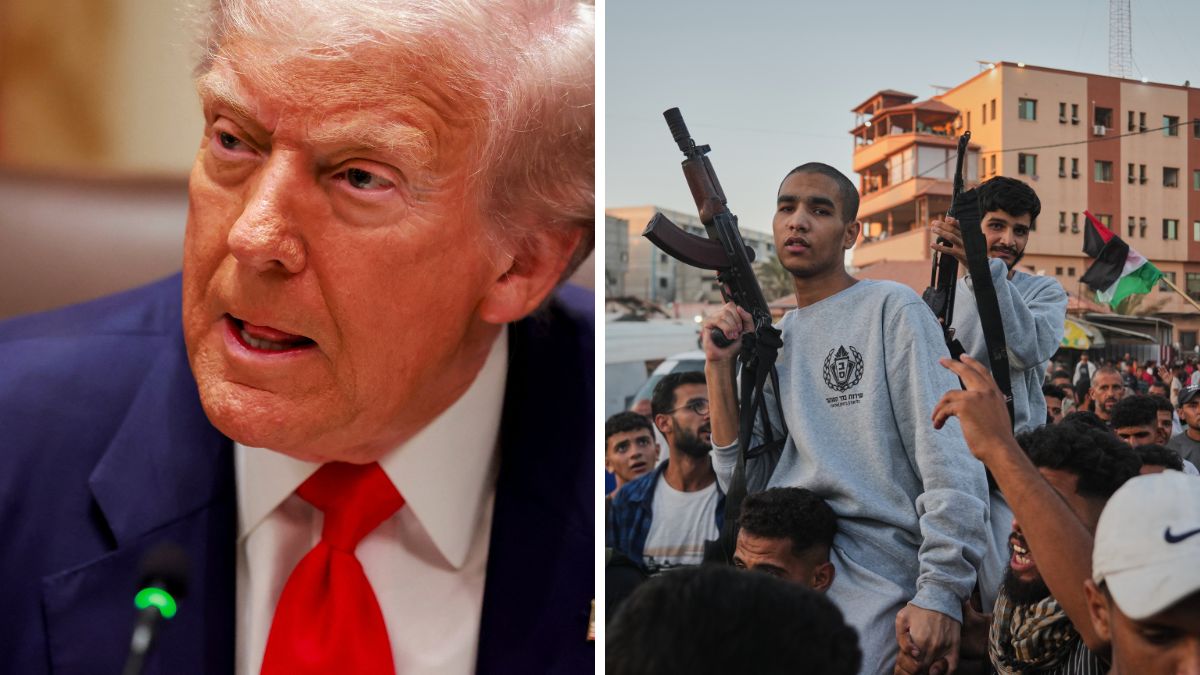Trump demands Hamas disarmament amid fragile Gaza peace deal
 US President Donald Trump. (Right) Freed Palestinian prisoners carry rifles as they arrive in the Gaza Strip following their release from Israeli jails outside Nasser Hospital in Khan Younis, southern Gaza Strip |AP
US President Donald Trump. (Right) Freed Palestinian prisoners carry rifles as they arrive in the Gaza Strip following their release from Israeli jails outside Nasser Hospital in Khan Younis, southern Gaza Strip |AP
US President Donald Trump has said that Hamas will be forced to disarm following questions about the group’s future after the signing of the Gaza peace deal. ”They know I'm not playing games. I spoke to Hamas, and I said, You're going to disarm, right? Yes, sir, we're going to disarm. That's what they told me. They will disarm or we will disarm them," Trump said while speaking to reporters yesterday at the White House after his return from the Middle East.
The demand for Hamas to relinquish its weapons is central to the agreement, although it remains loosely defined. The peace plan clearly requires Hamas to disarm and give up its control of the Gaza Strip. However, Trump also acknowledged that Hamas would play a limited role in short-term security operations before the second phase of the agreement begins. He said this temporary cooperation is necessary due to the complexities of rebuilding Gaza, pointing to the risks involved as nearly two million people return to devastated areas.
Israeli Prime Minister Benjamin Netanyahu endorsed this ultimatum, using even stronger terms to outline the consequences of non-compliance. He reiterated Trump’s message, warning that if Hamas fails to disarm, all hell would break loose. Netanyahu explained that demilitarisation involves two stages. First, Hamas must hand over its weapons. Second, systems must be put in place to prevent weapons manufacturing inside Gaza and the smuggling of arms into the territory.
Contrary to expectations for demilitarisation, Hamas is re-establishing its authority in parts of Gaza following the ceasefire and the partial withdrawal of Israeli forces. Armed fighters and police loyal to Hamas have been deployed in various areas, signalling a push to restore their control. The Ministry of Interior, controlled by Hamas since 2007, announced it was working to restore order and issued a general amnesty to members of armed gangs, provided they had not committed murder and turned themselves in within a week. This has been followed by shootings and public executions aimed at so-called collaborators and traitors.
The punishments are believed to target individuals associated with Israel-backed militias. One of those executed was Ahmad Zidan al-Tarabin, accused of recruiting agents for the rival Abu Shabab militia. Armed confrontations have also occurred between Hamas forces and the powerful Dagmoush clan in Gaza City. A Hamas security official said that a search was ongoing for Yasser Abu Shabab, the leader of a southern Gaza militia linked to Israel, noting that one of his associates had been killed.
Adding further strain to the fragile deal are controversial comments about future settlements. Finance Minister Bezalel Smotrich declared during a Simhat Torah gathering that there will be Jewish settlements in Gaza. He made this statement just days after Israeli troops pulled out of parts of the area they had seized. Smotrich tied his vision to the belief that Israel’s security depends on having settlements in Gaza. He said that while patience is required, determination and faith will guide the effort. His remarks have added a highly divisive element to a peace agreement already struggling with implementation, especially in light of disarmament disputes, violations related to the return of remains, and Hamas’s violent reassertion of control.
The return of the bodies of deceased hostages has emerged as an early crisis threatening the ceasefire’s stability. While 20 living hostages have been released by Hamas, the group has not fully complied with the clause requiring the return of the remains of up to 28 others. Initially, only four bodies were handed over, identified as Guy Ilouz, Daniel Peretz, Yossi Sharabi and Bipin Joshi. This limited return triggered warnings from Israel, which threatened to keep the Rafah border crossing closed and to scale back humanitarian aid into Gaza. Israeli Defence Minister Israel Katz added his own warning, focusing on another part of the agreement. He said any delay in returning the remains of Israeli hostages would be treated as a serious breach of the deal and would bring consequences.
Following international criticism and allegations that Hamas had broken the agreement, the group returned another four bodies. These were collected by the Red Cross, leaving 20 bodies still unaccounted for. The remains are being examined by the National Institute for Forensic Medicine in Israel before families are notified. The Hostages and Missing Families Forum has since demanded that the peace plan be suspended until all deceased hostages are returned.
Israeli officials continue to talk to the Red Cross about the return of the remains of the deceased hostages. “The issue is also being addressed with other international parties and continues in our actions with the mediators,” said Israeli liaison to hostage families, Brigadier General Gal Hirsch, in a statement. “I am in constant contact with our representatives in the talks and have been updated on the details. The issue is at the center of the agenda.”
Middle East